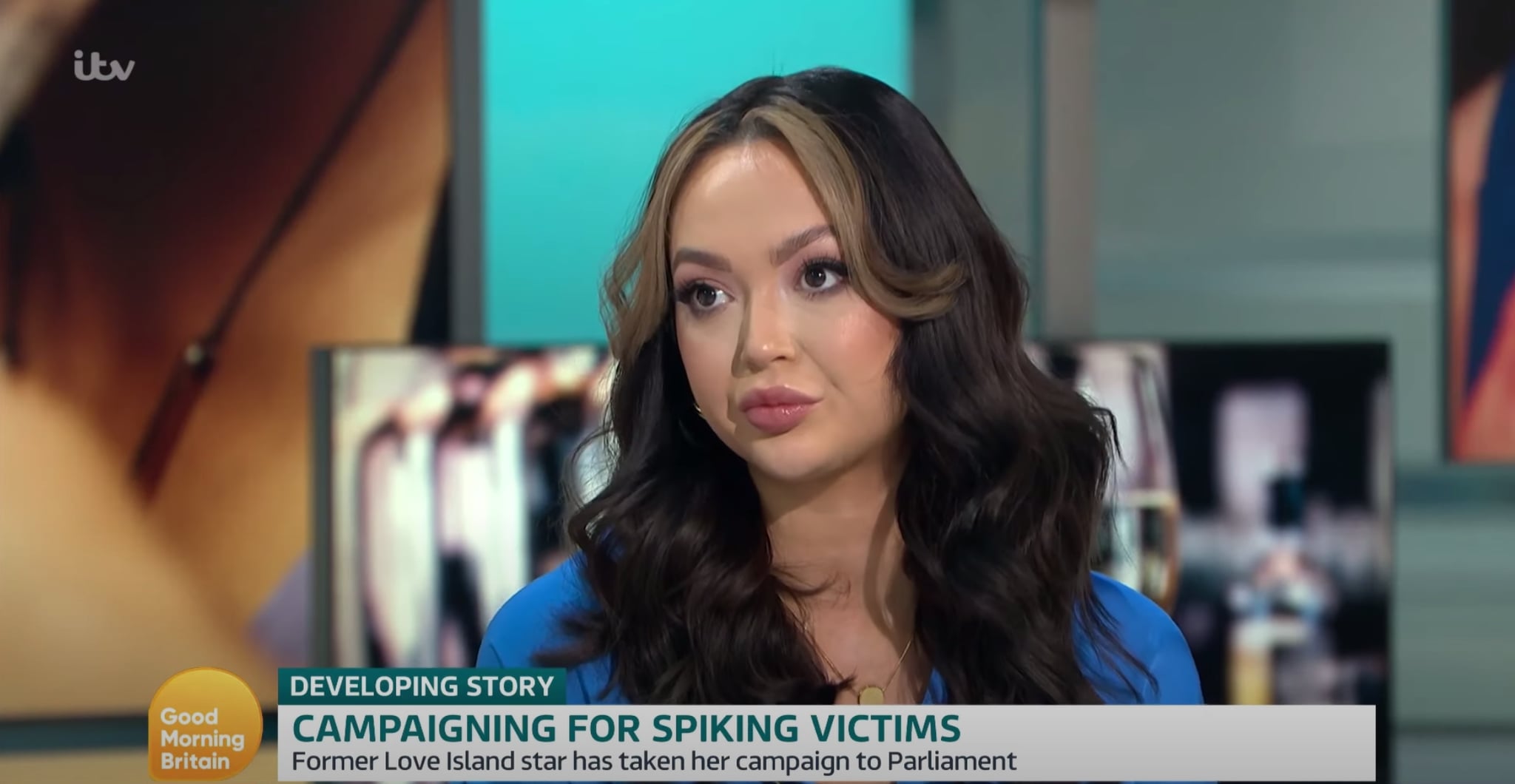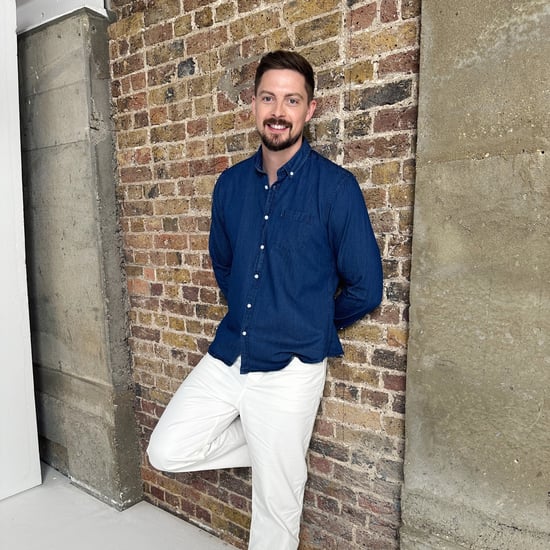Sharon Gaffka Opens Up About Her Anti-Spiking Campaign
Sharon Gaffka on Her Anti-Spiking Campaign: "I Didn't Know If I Was Alone"

There's been a resurgence in spiking incidents recently, with multiple reports of lethal injections being administered in nightclubs across the country in 2021, according to the BBC. While by no means a new phenomenon, spiking cases are on the rise, and it's becoming increasingly difficult to recognise and report. Former "Love Island" contestant and civil servant Sharon Gaffka has experienced spiking multiple times and believes the education system has a duty to inform people about the issue and how it can be prevented. She's kick-started an anti-spiking campaign that pushes for more proactive legislation and support for victims — and we caught up with her to find out more about it.
POPSUGAR: It's been a while since you appeared on "Love Island". How has your life changed since leaving the show?
Sharon Gaffka: It's changed in a lot of ways, which I expected, but it's not really one of those things you can comprehend until it's happened to you. I'm happy now that I'm doing something that I enjoy and that I'm in control of what I do — it's more fulfilling. Working on things like the spiking campaign — that's something that's really positive, and knowing that I'm having a positive impact on young women through my social media is something that I'm really happy about. Obviously, there's always a downside. When you're in the public eye, you leave yourself vulnerable and open. Especially with some of the subjects I talk about, you leave yourself open to trolling and people feeling like, because you're in the public eye, they can say what they want about your appearance and things like that.
PS: What's helped you deal with the negative side of the fame?
SG: I've always considered myself to be really fortunate that I have a lot of strong people around me. I can't really speak for everyone else, but I've kept the exact same friends I had before ["Love Island"]. They helped me get to where I was and they'll help me continue being who I am, so I'm very fortunate to have them and to have my management. They're so strong, and I feel like I can go to them with anything. In terms of other stuff, I've been really open about having CBT (cognitive behavioural therapy) as part of the welfare package from the show. I probably have a session once every week or once every two weeks, depending on how I'm feeling. I've got someone to help me with diet, exercise, and things like that, just to keep on top of my mental health.
PS: You've also been working on an anti-spiking campaign. How did that come about?
SG: I think, for me, it was something that I wasn't sure if I wanted to be so open about, because when you are, you have to relive that trauma. Every time you talk about it, it's something you're going to have to keep thinking about when you speak about it. The thing that kick-started it for me was hearing how much of a big issue it's becoming, people bringing it to the forefront — but it's not a new thing, and it's not something that's ever going to go away. It's not even something that's only just started. If there's one thing that I always said I wanted to do with the platform I've been given, it was to help other people, and this was just something that I naturally related to. I didn't expect to be as heavily involved as I've become, but it's just been a bit of a natural progression for me.
I thought that if I just shared my experience, then it would get people talking about it. If people normalise talking about their spiking experiences, then people might be strong enough to report it more to the police, and people can see how much of a big issue it's become. I've been fortunate enough to be able to share my experiences and have had loads of people come forward and tell me their experiences. I felt like I couldn't do nothing with [those stories], especially with my background and my education and things like that — I have the skillset and the team around me to be able to do something for other people.
PS: Definitely. How do you think situations like that can be prevented, if you think they can be?
SG: I met with my local MP and told him about a couple of the things that I wanted him to help me work on or help me engage with, in terms of what I think can be done to prevent it. I'm aware it's never going to be eradicated, unfortunately. It's something that we are going to have to deal with, but I think that there's a lack of education and understanding surrounding spiking. In my interview with "Good Morning Britain", I said that I've been spiked about a handful of times, and I got trolled for that. I think it's because people always automatically assume that it is a date-rape drug put in your drink by a stranger, when spiking can be a multitude of different things. It could be something as simple as your friend putting alcohol in your drink when you've decided not to drink.
For me, there's a lack of education on things like consent and spiking. That should be part of the sex education or PSHE syllabus. Also, spiking doesn't have its own legislative code. It's not its own standalone piece of legislation. It's only really covered under the Sexual Offences Act, when spiking isn't necessarily always done for sexual offences. I found that out when I was doing my research and when I was asking for testimonies. I think it puts both the police and the NHS staff in a bit of a grey area where they're like, "Well, can we really prosecute or do something with this if there was never intention for sexual assault?" If a hospital did a toxicology report on someone who had been spiked and it might not been with a drug, but might have been with alcohol, it wouldn't come up on a toxicology report — and therefore, the person would've been put down as drunk and irresponsible.
PS: Which is really harmful for the person that comes forward as well, isn't it? What's the reception been like from MPs and the people in the government that you've been speaking to about your mission?
SG: I feel like maybe because it's not an issue they have personally had to experience — they're really unsure about how to tackle it or how much of a problem it actually is. I don't think MP David [Johnston] was very aware of how big of a problem it was until I sat down and spoke to him and told him how horrific some of the stories I've heard are. There's a lot of questions that I think MPs want the answers to, but I personally can't give those answers to them, because I don't know. I don't know if anybody would ever know the answer, apart from the perpetrators themselves, and no one's really going to come forward and say they spiked somebody. I think maybe that's why they're finding it so hard to tackle, because there's so many unanswered questions.
PS: In terms of moving forward, what are the next steps?
SG: I asked David to write four letters to four different government departments. That includes the Home Office, the police, Ministry of Justice — in regards to the legislation and creating its own criminal code — and then to the Department for Education in regards to putting spiking and consent in the school PSHE syllabus. I've asked him to do that so we can start engaging with those government departments in terms of creating change in legislation.
I'm going to also take an approach where I reach out to organisations like Talk to Frank and similar websites that deal with drug information. When they cover spiking, it's very victim-heavy, victim-shaming language. I remember when I'd been spiked, it was the worst I'd ever felt, in terms of anxiety. I'd been spiked with the GHB drug, so there were a lot of things that I didn't know whether it was normal or not. I didn't know if I was alone, if this was normal, what should I be feeling, who I can speak to.
When I went on the internet and looked at loads of different websites, it was like, "To stop yourself from being spiked, you should cover your drink. You should not leave your drink alone. You should not be out on your own." And it's like, I can't speak for young men, but as a young woman, that's drilled into you from the moment you are old enough to walk and talk, that you shouldn't do these things. And it's like, yeah, I know that, I didn't do any of these things, but it still happened, so now what? There's nothing for the aftermath in terms of care for victims, so I'm going to go down that road as well and try to reach out to these organisations and change that.
"I think it's because people always automatically assume that it is a date-rape drug put in your drink by a stranger, when spiking can be a multitude of different things."
PS: Is that something you've had any kind of information about since? If a situation were to happen and someone was looking for advice on, "OK, what do I do now? I think this is what's happened to me," where can they go from there?
SG: It's very mixed. I feel like every police area or NHS trust has very different ideas of what should be going forward. That's one of the things I mentioned to David, that there's no standardised piece of advice. It's not like everybody knows that you should you go to the police if you think you've been spiked for a drug test, or you should go and speak to a doctor, or you should phone this number. I'm trying to find a way to be able to do that. I've had a lot of creatives reach out to me to see if we can make some leaflets and things to put in establishments, posters, and things to go online for certain organisations and stuff like that. It's early days at the moment, but hopefully that will be able to change the language surrounding spiking victims and provide more useful information on what to do.
PS: Overall, how has this experience been for you? It must have been quite difficult to reach into your own trauma and hear all these stories from other people.
SG: I knew it was going to be hard. I didn't expect as big a reaction as I've had. Initially, when I put out a request for testimonies, I expected to only get a hundred. I didn't expect to get 1,500. Because everybody wants to be anonymous — and I 100 percent respect everyone's privacy, because you don't always want to air your dirty laundry out — I had to read them myself. I didn't let a single member of my team read them, which meant that I read at least 500 stories from victims or friends of victims that have had the worst-case scenario, and that's been pretty tough. I think that's why it's so beneficial and helpful for me to have that CBT in place, that I have a confidential person that I can go to and share how I'm feeling. I'm very lucky that I have that coping mechanism in place there, but it is tough. I have to remember the reason why I'm doing it, and it's that if we can minimise this issue in the long term, it'll be worth it.
PS: Outside of this campaign, what are your other aims and goals? What are other things that you want to do?
SG: Long term, I see myself either going back to politics, but just in a different capacity, or having a relatively senior role in a young women's organisation. I've worked with Young Women's Trust for probably coming up to four or five years now, and that's definitely something that I want to carry on doing on a bigger level.






